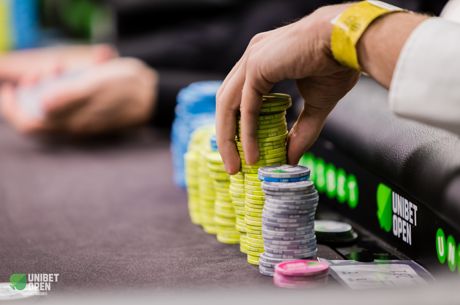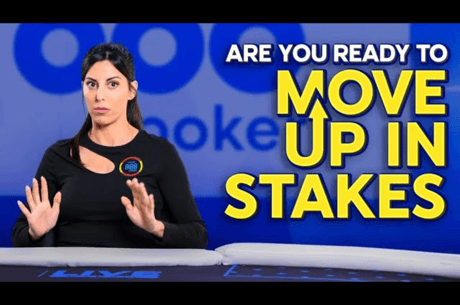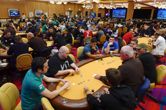Hand Review: A Flopped Set Gets Dicey on a Four-Straight Board

Covering live poker tournaments for a living affords me the opportunity to see countless thousands of hands played out, many of which offer interesting and potentially valuable insights into how players �� both amateurs and professionals �� play the game. In this ongoing series, I'll highlight hands I've seen at the tournaments I've covered and see if we can glean anything useful from them.
The Scene
For this week's hand, we go from one of the premier tournaments with one of the biggest buy-ins in poker to an $1,100 regional tournament, the RunGood Poker Series Horseshoe Council Bluffs Main Event.
The first-ever $1,100 Main Event in tour history was down to 16 players, right on the stone money bubble, when this hand went down. Andre Allen (pictured above, left) and Kipp Smith (right) had both been playing pretty snug, solid poker, and the tournament in general was pretty tight on the bubble as the next player eliminated would miss out on a $2,800 payday.
The Action
It was Level 16 (2,000/4,000/500) and after a button open by Allen and a call from the big blind by Smith, the flop came 5?4?9?. Smith checked, Allen bet 11,000 from the button, then Smith check-raised to 27,000. Allen called, then he called another bet of 35,000 from Smith after the 7? turn. The river was a 3?, and both players checked.
Allen showed 10?10?, but Smith had it beat with 4?4?, and the two players roughly swapped places on the leaderboard, with Smith moving to about 270,000 and Allen down to 145,000.
Concept and Analysis
Smith makes a standard defend with fours against Allen's button open and flops exactly what he's looking for with bottom set of fours on a somewhat coordinated board of 5?4?9?. Allen wasn't really a player who was typically out of line, so Smith decides to play the set fast and check-raise it, following up with a turn value-bet.
That's a solid plan overall, because if you figure your opponent usually has overpairs or unpaired big cards, you're not going to get any value from the latter hands anyway unless they get "lucky" and hit a pair or decide to run a big bluff. The latter scenario is a bit farfetched on the money bubble of a tournament against a player on the tighter side, so it's best to just focus on the times the opponent has hands that will pay us off in this spot.
The river brings a four-straight to the board, a final community of 5?4?9?7?3?, meaning any hand with a six in it makes a straight. Many players default to check in that spot and Smith does indeed check, with Allen checking behind and losing the showdown.
But truthfully, this is a spot where it's important to try to get one last street of value out of a set against most opponents. Could Allen have a six? Yes, but it's not that likely. The only hands with a six that really make sense for a solid player to show up with here would be A?6?, maybe 7?6?, and pocket sixes.
Furthermore, look at some of Smith's other possible holdings. From Allen's perspective, it's possible Smith has diamonds, and betting the river for value here balances a three-barrel semi-bluffing range of missed flush draws. It's also possible he has a six, so even if Allen has a six himself, is he even going to shove? Many players would just call, figuring they're only getting called by chops and nut straights like 8?6?.
Finally, the stack sizes are right for it. There's still about 140,000 effective between the two players, so Smith could make a nice value bet of around 50,000 and still have a reasonable stack left to preserve by folding if Allen shoves.
Smith made a strong hand here, and although he got some nice value out of it on two streets, I think it's a spot where a third bet for value was called for. It's natural to be leery of four-straight boards as they can be tricky to maneuver on, but you don't make hands as strong as sets too often, and it's very important to get max value when you do.
Be sure to complete your PokerNews experience by checking out an overview of our mobile and tablet apps here. Stay on top of the poker world from your phone with our mobile iOS and Android app, or fire up our iPad app on your tablet. You can also update your own chip counts from poker tournaments around ?the world with MyStack on both Android and iOS.









